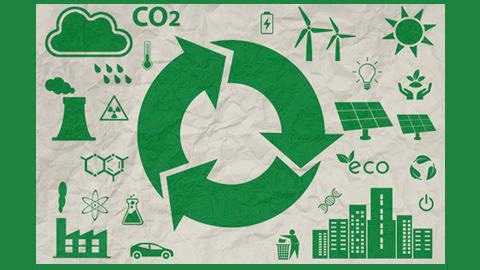Jun 28 2021
Industries should speed up their transition toward a resource-efficient, low-carbon and circular economy to reach climate targets.
 The UAB leads the €7 million VIVALDI project, which will develop a set of breakthrough biotechnologies to transform real off-gases from key bioindustries sectors into novel feedstock for the chemical industry. The project aims to reduce CO2 emissions from bioindustries and at the same time produce organic compounds in a cheaper and more sustainable way. Image Credit: istockphoto - lukbar.
The UAB leads the €7 million VIVALDI project, which will develop a set of breakthrough biotechnologies to transform real off-gases from key bioindustries sectors into novel feedstock for the chemical industry. The project aims to reduce CO2 emissions from bioindustries and at the same time produce organic compounds in a cheaper and more sustainable way. Image Credit: istockphoto - lukbar.
In that context, the chemical industry is one of the most difficult, yet also one of the most promising ones. In particular, bio-based industries (BIs) are at the forefront of waste reutilization and have the ability to pave the way and establish a new and more sustainable industry built on the principle of carbon capture and utilization (CCU), also known as CO2 recycling.
On the basis of this circular concept, BI's will cut down their greenhouse gas (GHG) emissions, their reliance on fossil carbon import and the manipulation of crucial resources, like land, water, energy and raw materials.
Beginning from June 2021, the EU Horizon 2020 project VIVALDI — which stands for innoVative bIo-based chains for CO2 VALorisation as aDded-value organIc acids — will design a set of innovative biotechnologies to convert real off-gases from major BI industries, such as Pulp & Paper, Food & Drinks and Bioethanol and Biochemicals, into new feedstock for the chemical sector.
The VIVALDI project mainly aims to capture, enrich and convert the captured CO2 into four platform organic acids through a two-steps process (biological and electrochemical).
The compounds obtained can then be used in many different applications. For example, they can be utilized in the same location, improving the circularity and sustainability of BIs products and processes, or provide new business opportunities as building blocks for innovative biomaterial (for instance, animal feed and bioplastics).
Incorporation of this concept will allow industries to “kill two birds with one stone”. In addition to reducing the BI's carbon emissions, the production of organic compounds that is currently energy-intensive will become more cost-effective and more sustainable.
We will develop tailor-made value chains for each type of company. We will boost the circularity of the plants with the use nutrients recovered from the same industries and will pave the way for the emerging CO2-based sector.
Albert Guisasola, Professor, Department of Chemical, Biological and Environmental Engineering, Universitat Autònoma de Barcelona
Professor Guisasola is also the coordinator of the VIVALDI project.
Replicability will also be a crucial aspect of VIVALDI solutions, enabling other bio-refineries and similar industrial segments to become more circular and decrease their impact on the environment.
The project success will be assured by an international and multidisciplinary consortium headed by the GENOCOV research team from the Universitat Autònoma de Barcelona (UAB).
The 16 associates include BI's (SunPine AB, Bioagra and Damm), technology developers (VITO, LEITAT, UFZ, Avantium, Processium, the Universitat Autònoma de Barcelona, the University of Natural Resources and Life Sciences - Vienna, and Luleå University of Technology) and end-user (Nutrition Sciences).
Novamont will explore the use of CO2 along its whole value-chain: right from capturing their CO2 emissions to converting it into new biochemicals.
The research team is complemented by three knowledge centers — the technology and innovation consultancy (ISLE), the sustainability and circularity expert group (BETA from the Universitat de Vic) and the European Association (CO2 Value Europe) that represents the Carbon Capture and Utilisation community in Europe.
Two different research teams from UAB will take part in the VIVALDI project. In one team, GENOCOV will be managing the VIVALDI project and heading the bioelectrochemical nutrient recovery from industrial reactors, looking after the design of an innovative electrobioreactor in which electrochemistry meets fermentative procedures.
In the other team, ENG4BIO will take part in the design and up-scaling of these fermentative procedures with their extensive knowledge in methylotrophic yeasts.
The consortium is set to redefine bio-refineries, visualizing a new CO2-based industrial sector that plays a key role in significantly reducing the industrial carbon footprint and improve the economy of Europe.